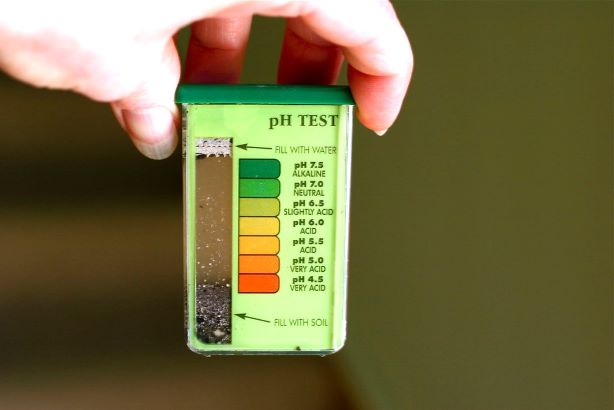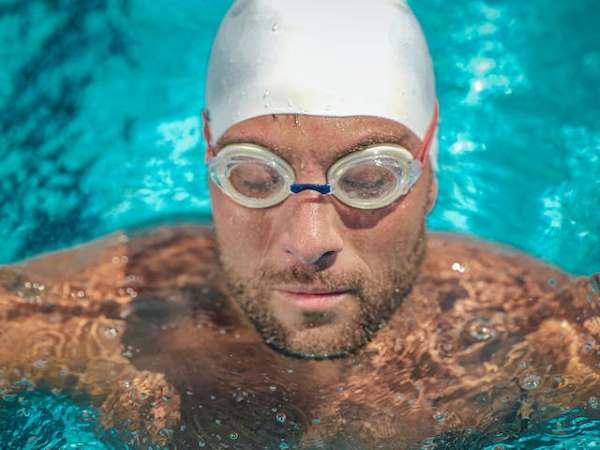What Does Chlorine Do To Your Eyes? Deep Details Revealed
To tell you the truth, chlorine is not good for your eyes. This is why you should wear your swimming goggles when swimming, as they will prevent the pool water from getting inside your eyes.
But just why is chlorine bad for your eyes? When water with chlorine gets inside the eyes, it reacts with the tear film, which is the eye’s protective barrier against microbes, dust, and other things. This therefore leaves the eyes vulnerable to attack from the different chemicals used in pool water. Itching, swelling, and redness of the eyes are some of the most common issues you will experience when chlorine gets inside the eyes.
It comes down to the pH balance

The pH balance of the water is usually neutral, at 7 on the pH scale. However, this changes as soon as you add chemicals like chlorine. It makes the water acidic, which is okay.
However, the problem is that the acidity level lowers the pH balance, to about 6.5. Now, this kind of acidity is not good for your skin, or your eyes. That is why it makes your skin feel too irritated and itchy.
The good thing is that as soon as you get out of the water, you can rinse with clean water, and reverse the reaction that the chlorine was starting to have with your skin and eyes.
How does swimming pool chlorine affect your eyes?
Swimming pool chlorine affects blonde hair, so you are advised to wear a swimming cap before getting into the water. In the same way, chlorine is bad for your skin!
Of course, the effect of chlorine on hair and skin is widely discussed. However, not many people know that swimming pool chlorine is not good for the eyes.
So, how does chlorine react with your eyes? Keep reading!
1. Chlorine makes your eyes red and itchy
In the same way that chlorine makes the skin dry, it also dehydrates the eyes. It does this by reacting with the tear film that keeps the eye wet and also protects it against bacteria.
When the tear film is interrupted, the eye can sustain damage easily. It can also become dry and red.
The good thing is that the tear film rebuilds itself easily, so the redness caused by chlorine will not last long. Some people have also reported experiencing blurry vision, but again, this lasts a short time.
Chlorine also irritates the eyes, which causes the veins that supply blood to the eyes to dilate and come closer to the surface. This is what causes the redness in the eyes.
2. Conjunctivitis or pink eye
Conjunctivitis is caused by bacteria or viruses that thrive in swimming pool water. When you shock the swimming pool, the chlorine is supposed to kill all the bacteria, viruses, pee, or poop in the pool.
However, since there is no exact measure of chlorine that you can add to the water, you might add too little, such that some microbes survive.
The chlorine then reacts with the tear film of your eyes, and creates an entry for the bacteria or viruses from the water. It is these microbes that cause conjunctivitis, or pink eyes.
3. Acanthamoeba keratitis
This is a serious condition of the eye that can cause permanent sight loss if not treated quickly. It is caused by an amoeba called Acanthamoeba, which stays in the water. The chlorine that you add to the pool might not kill this amoeba, therefore causing serious eye infections.
If this amoeba is trapped between the eye and the contact lens, it will cause infection. This is why you should always remove contact lens when swimming.
But the good thing is that you can swim with contact lens and goggles.
Once the chlorine tears the tear film, the amoeba can get inside the eye. This is why you should always protect the tear film from damage.
4. Chlorine can cause discharge from the eyes
Exposing your eyes to the swimming pool water is unavoidable, that is, unless you have the equipment for it. If you do not wear your swim goggles, your eyes could develop problems later.
If you start to experience a yellow or white discharge from your eyes a few days after swimming in the pool, the chlorine is most likely to blame.
The discharge could also have a mucus texture and be clear. While you should not rule out other causes, the time you had in the saltwater or chlorine pool could be to blame.
5. Pain and sensitivity to light
If the eyes are affected in any way, they become sensitive to light. It is also possible to experience blurry vision, which clears up after a short time. If the light sensitivity disappears after some time and the vision clears, chlorine is to blame.
If you forgot to remove your contact lenses and chlorinated water got trapped between the lens and your eye, the effects could last longer.
How to protect your eyes from chlorine

Exposing your eyes to chlorine is not advisable. You should do everything you can to protect them. Most people have a problem swimming underwater. They have an even bigger problem when the pool water gets inside their eyes.
But apart from closing your eyes when you are swimming, in which case you might miss your mark and not be able to swim faster in the pool, there are other things you can do.
1. Wear swimming goggles
This is the most obvious solution to this problem. Today, you can get high-quality swimming goggles designed with a silicone skirt that sits tightly but comfortably on the skin.
With these goggles, you can swim with your face underwater, and the water will not get inside your eyes. Of course, you will need to time your breathing so that you don’t drink pool water.
If you wear glasses, it is possible to swim with bad eyesight. However, you would need to get swimming goggles that you can wear over spectacles.
2. Take a shower as soon as you get out of the pool
Taking a shower with clean water can help a great deal for the skin and the eyes. Remember, even if you cover yourself up by wearing leggings for swimming, goggles for the eyes, a swimming cap for your hair, and others, your body will still come into contact with chlorine.
Do not blast your eyes with clean water, because if it is forceful, it can cause damage. Rather, just wash your face longer, and rinse it thoroughly.
3. Go for treatment if you experience discharge
If you experience blurry vision, and it stays longer than an hour or two, you need to see a doctor. You also need to see a doctor if you have yellow or mucus-like discharge from the eyes.
You can ignore redness and itching and wait for it to disappear on its own, but you should never ignore discharge. It usually indicates something more serious with your eyes.
You can also try home treatments such as over-the-counter eye drops, placing a warm towel over the eyes to reduce swelling and redness, and staying out of the light for a short while.
Wrapping it up
When you are swimming in the pool, try hard to keep the chlorine water out of your eyes. The best way to do this is to wear a nice pair of swimming goggles.
Also, stay on top of your eye health. If they were already sick, the chlorine would make them worse. Therefore, if they are sick, get treatment first, and then wear your swimming goggles.
Never swim with contact lenses, because chlorine damages them. And that is not all because it is also easy to lose your lenses in the water.
Finally, what should you do if you get chlorine in your eye? Gently flush the eye with clean water. The chlorine will come out without causing any damage.
